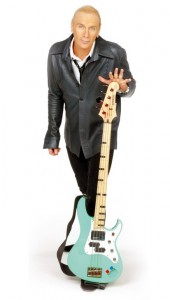Justin’s Japan: Q&A with Billy Sheehan of Mr. Big
By JQ magazine’s Justin Tedaldi (CIR Kobe-shi, 2001-02) for Examiner.com. Visit his page here to subscribe for free alerts on newly published stories.
Considered by many to be the Eddie Van Halen of bass, Billy Sheehan launched his recording career in the late ’70s with the Buffalo-based rock trio Talas, then joined original Van Halen frontman David Lee Roth’s band in the mid-’80s for two platinum-selling albums. After parting with Diamond Dave, Sheehan formed Mr. Big in 1988. Best known for its hit ballad “To Be with You”—which went to number one in 15 countries including the U.S. in 1992—Mr. Big called it quits a decade later, but in 2009 the original lineup reformed for a massive tour of Asia and Europe.
In February, the band released What If…, the first album in 15 years from the reunited rockers, which instantly went gold in Japan upon release. I spoke with Billy about the new album, his long relationship with Japan, and Mr. Big’s future touring plans.
What are some of your favorite “culture shock” memories from Japan?
Let’s see. Well, I toured with a Japanese band called B’z [in 2002], and they’re a huge band. One of their singles released that I played on [1999’s “Giri Giri Chop,” with Pat Torpey] sold, I think, three or four million units in a day; they’ve sold more records in Japan than Madonna has sold. Amazing statistics; wonderful bunch of guys, too. But we’ve played in little, tiny places where very few Western bands have ever performed. We did a thing on this little island where at the hotel there weren’t even Western numbers on the doors, so I had to remember the character of the kanji on the door to try to remember which door was mine, and that was an interesting moment for me.
It must have been a thrilling experience to go on tour with them.
We played all over. In Mr. Big, that’s one thing we’ve done, as well. Most bands [play] Tokyo, Osaka, Nagoya, and that’s it. But we’ve done Sendai, Kagoshima, Niigata, Sapporo, Fukuoka; all kinds of little places, a lot of places where many bands don’t get to. In Sendai, the first time we played there, we found out that they were having a petition to have Mr. Big play there. It had 30,000 signatures on it, and the place we were playing could only hold about 5,000 people, so we asked, what happened to the other 25,000 people that signed the thing? It was pretty fun; a sweet, sweet beautiful little city, great spot. We were very lucky to see a side of Japan that not a lot of Westerners see. It’s a very inspirational experience.
In your opinion, how do you think Japan has changed from the time you first went there up until now?
I know the economy’s been in trouble for a while, so now we’re starting to see things like discount stores and prices that aren’t set anymore; that’s a new thing for them, to go into a store and not pay absolute full retail for something, which they did for a long, long time. Now, they’re actually looking for bargains. That’s an interesting cultural change that not a lot of Japanese folks are used to. Also, the idea that once you work for a company, you are there for a lifetime of work; it’s not as secure anymore. So, I do believe there is a little bit of concern and worry amongst the average folks now that things are changing, and it’s sad to see. It’ll be interesting to see how things play out in the end.
When you played the Mr. Big reunion shows in Japan in 2009, did you notice any shift in the people who were coming to the shows?
We were very, very surprised at how many young kids were in the audience. We had a few gray heads of hair out there, too, of course, but there was amazingly a very large amount of very young kids, because I guess like any band, when you’re fortunate enough to get to some plateau of success, things start to kind of become timeless, as with this whole Beatles fans thing—I’m not comparing ourselves to them, of course, but same principle. So, we’re pleasantly surprised to see a lot of very young people whose parents probably turned them on to it, or their older brothers or sisters. So, that was a great thing.
You’re spanning generations now over there.
Yeah, I think there’s probably three generations easily being represented in the audience. We’re so thankful.
You’ve been known to get extra work and gigs in Japan over the years, like the B’z tour, Hard Rock Cafe radio spots, bass clinics, and other appearances. Do these usually come to you by reputation, or do you have to actively campaign for them?
Generally, they come to me, which I’m humbled by. It’s awful nice of them to consider me for their endorsement things and what have you. Fortunately, the press in Japan is thorough and omnipresent, so we really get a lot of coverage, and if we get fortunate enough to have a reputation that precedes us, that’s pretty cool. And it’s been an incredibly lucrative thing, to be frank—we’ve made a lot of money from Japan. And when we played there, we realized that. So, we played, and I came off the stage and practically collapsed from exhaustion a couple of times, because we push hard in our appreciation for what we have now as a result of the fans there. We don’t forget it for a minute. That’s pretty awesome.
Click here for the complete interview.



Comments are closed.